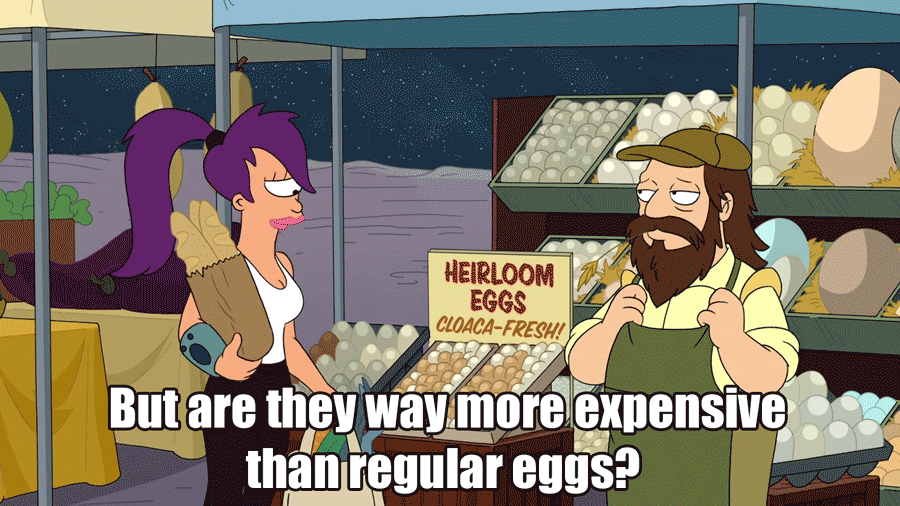‘Moral’ Eating Is Only for Rich People

By MATT SHAPIRO
I appreciate the joy of good food.
I don’t consider myself a “foodie” any more than I consider myself an “air-ie” or a “sIeep-ie” or an “ie” of any essential element of human life. But I like to follow food trends just enough to be able to pronounce “pho,” I love Korean barbecue, I make étouffée, and I know that Germans love French food (even though German food matches my tastes).
 This is my favorite Google result for “German food” because it’s so damn accurate.
This is my favorite Google result for “German food” because it’s so damn accurate.
But I’m frequently bothered by the elitism embedded in many food trends, mostly recently “farm-to-table.” Megan McArdle wrote an insightful response in Bloomberg View to Laura Reiley’s exposé on alleged “farm-to-table” dining that revealed one of the worst trends in food appreciation.
The idea of “farm-to-table” dining is that all the food in a meal is grown locally, unprocessed, and transported short distances to a kitchen or market. The goal is to minimize industrial farming and mechanized food processing and preservation to deliver an ideal of fresh, healthy eating.
Unfortunately, in practice farm-to-table is largely a fiction that separates wealthy, socially conscious people from their money. This mindset is far more dangerous than we realize.
The best food appreciation is something that everyone can enjoy, regardless of income. This is something that I was passionate about when I spent six weeks eating off a food stamp diet. You don’t have to spend a fortune to eat well. It’s easier to eat well if you have more money, but a lack of extra income shouldn’t block us from an essential joy of life.
It’s when we start to mix our diets with morality that we risk creating a truly awful world. When we create a moral code that is linked to more expensive forms of food, we create a moral code in which the wealthy can luxuriate in their own sparkling morality while the poor are condemned not only to have less, but also to be morally inferior to the rich.
 Fortunately, organic foods are the subject of frequent mockery.
Fortunately, organic foods are the subject of frequent mockery.
Eating to live can be fairly inexpensive. We can exist on canned food, processed food, “corporate” food (whatever the hell that means) for reasonably little money. Welcome to the wonderful world of modern capitalism.
But things like organic food throw a wrench into the works. Part of the argument for organic food is that it is better for you. This is … debatable. But the other component of the argument for organic food is that it is morally better. Better for the environment. More humane toward the animals. You’re a better person if you can afford organic food.
This attitude is horrifying.
There is a smugness that fills the air when we define a more expensive manner of living as more morally upright. The subtle message is that we can purchase virtue. There is a insidious attitude that even though you and I live in roughly the same way, I’m better than you because I eat organic, I buy farm-to-table … and ultimately I’m able to do this because I make more money than you do.
It is a very ugly world in which we price middle and lower income families out of virtue.
 In the world of food appreciation, this guy is the hero
In the world of food appreciation, this guy is the hero
Do you make an upper-middle class income? Something around $70,000 to $90,000 or more a year? And do you live in an urban setting large enough to support a restaurant or store that caters to dietary virtue seekers such as yourself? If so, you may join the ranks of the righteous.
But if you can’t afford that, you may just have to settle for being not as “good” as those who make more than you. Or you may have to sacrifice your emergency fund, your savings, your children’s education, in order to be a “good” person (as defined by these dietary choices).
The question becomes … do you want to be a good person?
Ordinarily, this is an important question for all of us, religious and secular, rich and poor, young, old, smart, stupid. We should want to do what is right. We should want to be good people. This universal truth transcends our income level.
Unfortunately, a large segment of our culture subtly and cruelly rejects the idea that you can be poor and also good. Do you want to be a “good” person? Well, you can’t hop on an airplane to visit your family across the country because that releases obscene amounts of CO2 into the atmosphere. You’re killing the planet. Unless, of course, you’re an upper-middle class person who can buy carbon offsets to atone for your carbon sins. Then you get to spend time with your family and still be “good.”
All these moral hardships fall on the poor. There seems to be a sense within far too much of our culture that the ideal income is to make enough to live comfortably while buying your morality and looking down on people who can’t. You’ve arrived if you can get by while lecturing others for not matching your standards—which is really just lecturing them for being poor.
We don’t say this in so many words, but this is how we act. And let’s not fool ourselves: our message of disdain and condescension is heard loud and clear by those who can’t afford the life of righteousness we purchase. We believe integrity and goodness can be bought and, by making enough money to afford it, we are better.
Matt is a software engineer, data vis designer, genetics data hobbiest, and technical educator based in Seattle. He tweets under @politicalmath, where he is occasionally right about some things.


